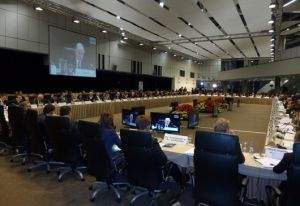
Mr. Chairman,
First of all, I would like to congratulate our host, the Minister for Foreign Affairs of Lithuania, for holding the Ministerial Council Meeting in this welcoming corner of Northern Europe with such a warm hospitality.
I wish to recall that the Corfu Process launched in 2009, during the Greek OSCE Chairmanship, served as a compass guiding us through the alleys of an open, transparent and inclusive dialogue that used the cooperative advantages of the OSCE as a platform for dialogue and cooperation and served the sense of commonality of purpose well.
Greece is convinced that while preserving the spirit of and the experience gained through the Corfu process, we have to make full use of the OSCE structures and tools to strengthen the concept of indivisible, comprehensive and cooperative security, identify problems, understand others’ perceptions, iron out differences and search for commonly acceptable solutions.
In practice, however, our tools have proven too cumbersome and ineffective for prompt use, and political will was not always present when most needed.
Enhancing the Organization’s capabilities in addressing conflicts and crises is a very important endeavor that will allow us not only to react promptly and adequately, but also to preserve the credibility and consistency of OSCE mediation efforts and engagement in post-conflict rehabilitation.
We welcome the meeting of the “5+2” format for the settlement of the Transdnistrian conflict, that took place a few days ago in Vilnius, and the political will demonstrated by all parties involved to commit themselves in seeking a lasting and comprehensive solution to the dispute with respect to territorial integrity and sovereignty of the Republic of Moldova.
We also express our support for the continuation of the Geneva Talks, as a unique forum to resolve the crisis in Georgia, as well as for the efforts of the OSCE Minsk Group to promote a viable and lasting solution of the Nagorno-Karabakh conflict.
We are particularly pleased by the process taking place in the Forum for Security Co-operation of updating and modernizing the Confidence and Security Building Measures of the Vienna Document.
As new security threats appear, many of them of a transnational nature, we must address, as a matter of priority, problems that could lead to social unrest and disrupt normal life.
Many of our societies are faced with extraordinary economic hardships, unemployment and illegal migration.
Others encounter more or less directly, problems caused by the scourges of terrorism and organized crime of all kinds.
Cooperation, synergy and solidarity are needed in order to collectively address these threats and secure that each one of us will become a strong and not a broken link in the chain of international efforts.
Especially in the area of illegal migration and migration management, which is of particular importance for my country, we believe that the OSCE can make an important contribution due to its wide membership and wide-ranging approach. In this regard, we have proposed the creation of a Network in order to implement our joint commitment to provide a broad platform for dialogue on migration issues.
Turning to another important issue, we believe we need to reflect on how climate change impacts security and stability in the OSCE region and what we can do complementary to UN efforts in meeting this challenge. Our efforts to ensure environmental security must go hand-in-hand with a more efficient energy policy, at a national and regional level, which places paramount priority in increasing the share of renewable energy resources in the energy mix. It goes without saying that energy security in a broader sense remains in the heart of the OSCE concept of comprehensive and cooperative security.
Greece recognizes the progress achieved in recent years through dialogue and cooperation with our Mediterranean and Asian partners attaching great importance to their potential contribution towards strengthening the security of the OSCE area in all three dimensions.
As we have long advocated that the security in both shores of the Mediterranean is undoubtedly interlinked, my country welcomes the political reform processes undertaken by some Southern Mediterranean States in the course of this year and stands ready to support the transfer of our Organization’s expertise in any areas the states concerned may find of interest.
Greece, remaining always open to considering future applications for partnership from interested countries, welcomes Mongolia’s desire to become an OSCE participating State and stands ready to support it.
Since its inception, the OSCE has never been a solely intergovernmental forum. Its aim was to reunify the peoples of Europe. In this effort we consider crucial the role of the Parliamentary Assembly, which brings together the elected representatives of the peoples. It is a great honour for us that the Presidency of the Parliamentary Assembly has been entrusted, for a second year, to my compatriot, friend and colleague, Petros Efthymiou. I am sure that he will continue to promote in the Parliamentary Assembly the same spirit of partnership that the Greek OSCE Chairmanship brought to the Organization in 2009.
Finally, our Meeting here in Vilnius, represents for us an opportunity and a challenge to take substantial decisions in order to pave the way for the OSCE’s future role in preserving peace and stability in our region.
Let’s use this opportunity and face the challenge. In this spirit,
I wish to extend my good wishes to Ireland for its upcoming Chairmanship. I am sure that under its leadership many opportunities will be grasped. I would also like to congratulate Switzerland and Serbia on their joint bid for the 2014 and 2015 Chairmanships that we wholeheartedly support.
Thank you, Chairman.
December 7, 2011


